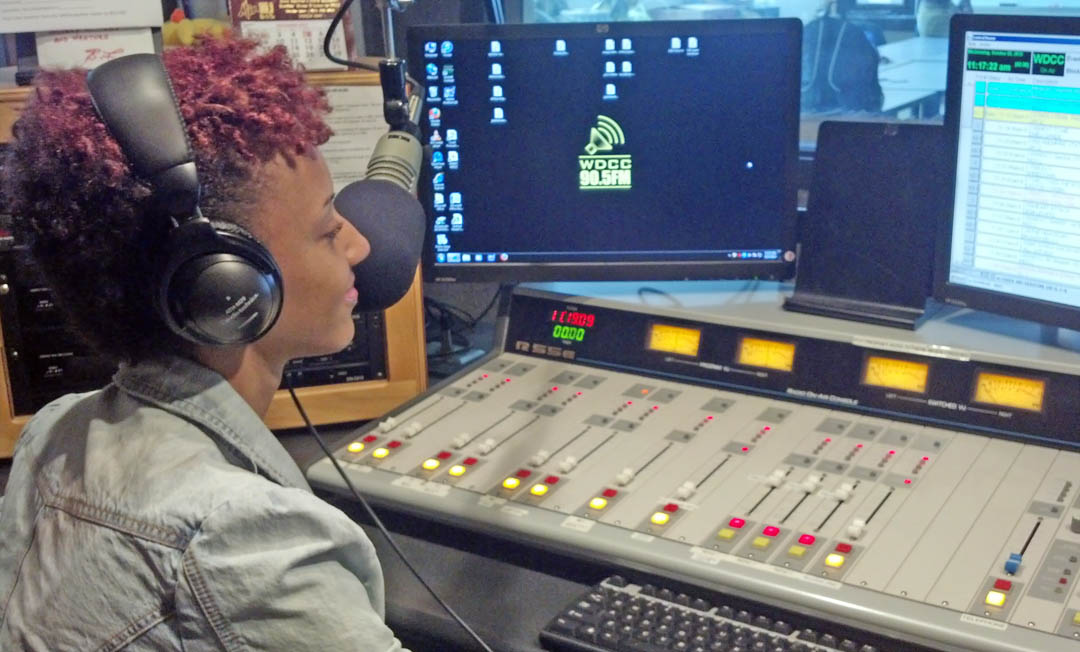
College News
CCCC Broadcast Production moves to Harnett County Campus
10.15.2013 • Admin, Faculty & Staff, College & Community, College General, Curriculum Programs
LILLINGTON - The 2013 fall semester at Central Carolina Community College signaled a new chapter in the college's Broadcasting Production Technology program.
The relocation of the program's radio station, WUAW, from Triton High School to CCCC's Harnett County Campus, in Lillington, paves the way for interested Harnett County residents to pursue an education in radio broadcasting. The decision to make the move to the Bob R. Etheridge Advanced Technology Building was made in 2012.
Established in 1970, the Broadcasting Production Technology program offers several credential options. Students may earn a one-year diploma in either radio or television production, but most choose the two-year Associate in Applied Science degree that provides instruction in both fields.
"Students get hands-on training using the latest digital video and digital audio equipment with an instructional foundation in media concepts," said Bill Freeman, the college's director of Media Technologies. "Students put their knowledge to work in modern audio, radio, and video studios.
Graduates of the program are eligible to work in radio, television, audio, video and related applications such as media production, digital editing (both audio and video) media management, on-air, and sales.
In the radio sequence, students study digital audio recording and mixing, microphone techniques, sound effects, Adobe Audition software, and live announcing. They also work on-air as DJs.
In the television sequence, students create high definition (HD) video content to be shown on the college's cable channels. 4CNC-TV is now available throughout 17 central North Carolina counties via Charter, Time Warner, and Prism cable systems. Streaming from the CCCC homepage is also available worldwide.
The television curriculum also includes digital editing with Adobe Creative Suites, digital and multimedia production, directing, producing, HD video photography, shot composition, live studio production, field production, video graphics, lighting design, digital video effects, plus broadcast writing and reporting of news and feature stories.
The video studio is outfitted with an HD Tri-caster system, HD cameras, lighting and green screen for virtual sets. Some graduates have continued to study digital film making with the experience gained at CCCC.
Media concepts include an introduction to the industry, FCC Rules, revenue sources, media law and ethics, financial and personnel management, scheduling procedures for electronic media, and station programming. Basic communication and voice skills are also emphasized in this curriculum.
In addition, the Broadcasting Production program includes an industry internship that helps open doors for employment. Faculty members have strong working relationships with broadcasting and media arts as well. Freeman has 27 years experience in broadcasting, starting at CCCC in 1986 as a full time audio/visual specialist and working as an instructor since 1997. He became department chair in 2004 and director of Media Technologies in 2012.
Coordinator/Instructor of Television Production Technology Kassandra Lyles is a veteran of 17 years in as a television director, working in several states throughout the U.S.
"The AAS program is a very hands-on, intense, energetic and creative two years," said Lyles. "But students are ready for immediate employment in broadcasting."
Although the program is designed to prepare students for immediate employment, some continue their education at four-year colleges and universities. A dual enrollment agreement with Fayetteville State University allows students to further their studies in a variety of degree programs within the Department of Communication.
The Media Technologies Department operates two student radio stations and two cable channels: WDCC-FM, WUAW-FM, 4CNC-TV and Lee County Government (LCG)-TV.
Located on the Lee County Campus, in Sanford, WDCC-FM is a 3,000-watt station broadcasting 24 hours a day, year-round. WUAW, 88.3 FM, was formerly located in Erwin and operated from Triton High School 24 hours a day, seven days a week. The station's call letters are an acronym for the phrase, "What You Always Wanted." The station now programs the top hits from the Pop, R&B/Hip Hop 100 charts.
"CCCC continues to improve and expand its broadcasting production programs, allowing students to have one of the best educational experiences in the state," Freeman said. "Nationally, our students have the rare advantage of operating two full-time FM radio stations and two full-time cable channels. Together, they cover a market of over 17 central North Carolina counties. This makes for true hands-on, real world training!"
For more information on CCCC's Broadcasting Production Technology program, contact Bill Freeman at 919-718-7257 or by e-mail at bfreeman@cccc.edu.

Central Carolina Community College Broadcasting and Production Technology student Tamira Eason, of Harnett County, prepares to go on-air. The college has moved its WUAW radio station from Triton High School to CCCC's Harnett County Campus, in Lillington. This creates a greater opportunity for members of the public to pursue an education in radio broadcasting. For more information on CCCC's Broadcasting Production Technology program, contact Bill Freeman at 919-718-7257 or by e-mail at bfreeman@cccc.edu.
- Central Carolina Community College
- Serving Chatham, Harnett, & Lee Counties, NC
- 1-800-682-8353

